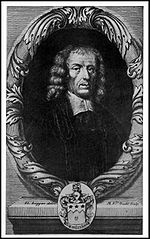
Back Кеймбриджки платоници Bulgarian Escola de Cambridge Catalan Cambridgeská škola platonismu Czech Cambridger Platoniker German Escuela de Cambridge Spanish افلاطونیان کمبریج Persian Cambridgen platonistit Finnish Platoniciens de Cambridge French Platonici di Cambridge Italian ケンブリッジ・プラトン学派 Japanese

The Cambridge Platonists were an influential group of Platonist philosophers and Christian theologians at the University of Cambridge that existed during the 17th century.[1] The leading figures were Ralph Cudworth and Henry More.[2]
- ^ Carrigan Jr., Henry L. (2012) [2011]. "Cambridge Platonists". The Encyclopedia of Christian Civilization. Chichester, West Sussex: Wiley-Blackwell. doi:10.1002/9780470670606.wbecc0219. ISBN 9781405157629.
The Cambridge Platonists were an influential group of 17th century philosophers and clergy whose teachings on philosophy and theology later influenced Leibniz, Locke, the Scottish common sense philosopher Thomas Reid, and Kant. They thrived at Cambridge largely between 1633 and 1678, though their younger disciples carried their thinking into the early 18th century. They identified themselves neither with the Puritans nor the High Anglicans, and they encouraged toleration within the church. The Cambridge Platonists drew on the dualistic philosophies of mind and matter of Plato (427–347 BCE) and Plotinus (205–270 CE), contending that mind is prior to matter and that reason is superior to knowledge derived from the senses. They developed the ideas that reason and morality reside in the human mind and that reason is indeed the indwelling of God in the mind that allows individuals to judge both natural and divine revelation. This group of thinkers, who were among the first to write philosophy primarily in the English language (rather than in Latin or French), believed that the rational and the spiritual could go hand-in-hand. These philosophers taught that human nature possessed an innate tendency toward goodness and that human nature was perfectible. Humans possess free will, and they learn rationally the wisdom of practicing Christ's universal love. Thus, while the Cambridge Platonists devoted their energies to metaphysical questions regarding the immortality of the soul and the existence of God, they also attended closely to morality and the principles of daily living.
- ^ Stuart Brown (1 May 2003). British Philosophy and the Age of Enlightenment: Routledge History of Philosophy. Routledge. p. 23. ISBN 978-0-415-30877-9. Retrieved 16 April 2013.
© MMXXIII Rich X Search. We shall prevail. All rights reserved. Rich X Search